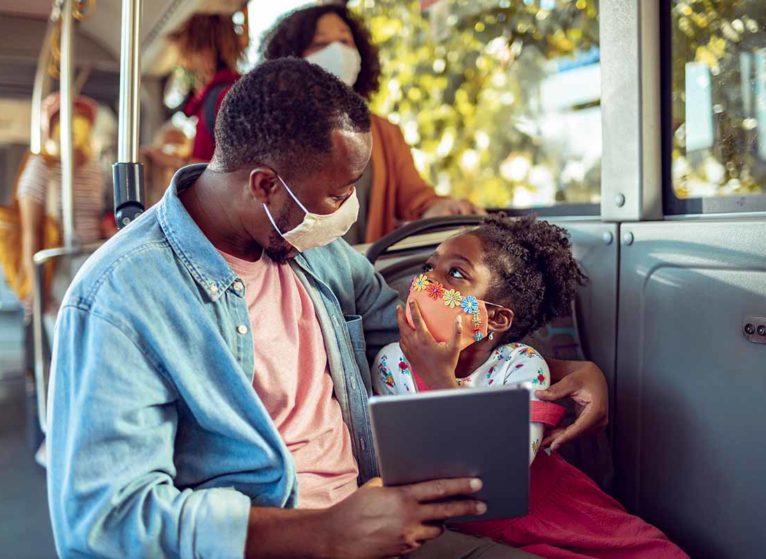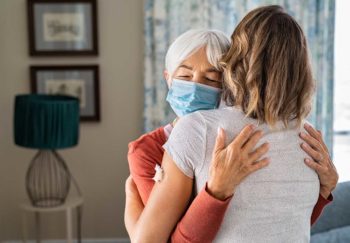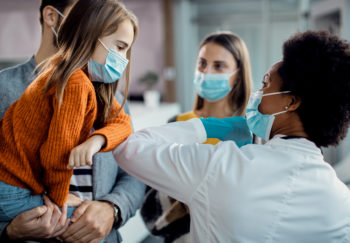More than 20 months into the COVID-19 pandemic, many of us have grown tired of wearing face masks. If you’re one of the nearly 71 percent of Virginians who has received at least one vaccine dose, you may be wondering: Do I still need to wear a mask?
The short answer: Yes. Don’t let your guard down, health experts say. With the highly contagious Delta variant lingering and the flu season approaching, it’s important to remain diligent. Mask-wearing is still one of the most effective ways to prevent the spread of the coronavirus.
“Even though vaccines are very effective at preventing severe disease, breakthrough infections can occur,” says pediatrician and infectious disease specialist Debbie-Ann Shirley, MD. “Masks are another one of the most important layers of protection you can add to reduce the risk of spread of COVID-19.”
Why Does My Child Have to Wear a Mask in School?
Public health officials still recommend masks in indoor public venues and crowded outdoor settings. This includes Virginia’s K-12 schools, where a statewide policy mandates students, staff, and visitors wear masks.
Recent research supports the benefits of mask wearing in school, Shirley says. A study from Arizona, for example, showed that schools without mask mandates were 3.5 times more likely to have COVID-19 outbreaks. And data from 500 counties across the United States found that those without mask mandates had higher rates of pediatric cases.
“Many children have not yet been able to access the COVID-19 vaccines because they’re too young, and of those who are eligible, only half have been vaccinated,” Shirley says. As of November 2, everyone ages 5 years and older can receive the COVID-19 vaccine, so many more school children will have the opportunity to be vaccinated. “Masking still adds an extra layer of protection for students and staff. This also decreases the risk of bringing the virus home to their families.”
Children generally don't get as sick from COVID-19 as adults do, but severe disease can occur. Still, an infection:
- Means a substantial time out of school
- Puts family members, unvaccinated kids, and others at risk
- Keeps the virus alive and able to mutate
The bottom line: Wearing a mask is a simple intervention critical to your child’s education and to the health of your local community.
What Types of Masks Are Best?
Masks have different qualities. Surgical medical masks provide strong protection against COVID-19, but cloth masks with more than one layer also work. Gaiters may be less effective, but can be improved by folding to make two layers. Health experts do not recommend masks with exhalation valves or vents. Save the N95 masks for healthcare workers.
Worried that a mask will hurt your kid's breathing? Don't. Masks don't decrease the amount of oxygen you breathe in. Oxygen and carbon dioxide are tiny molecules that can pass through masks. Respiratory droplets that contain Coronavirus, on the other hand, are larger and do not pass through most mask materials as easily. The virus can escape around the sides of the mask though, so regardless of what type you choose, make sure the mask fits properly on your face. It should cover your nose and mouth without gaps. Masks are not recommended for children under age 2.
Want to Stay Safe?
Find out everything you can do to prevent a COVID infection.
You Can't Stop Wearing a Mask Yet
If you’ve been fully vaccinated, you may want to plan a ceremonial mask-burning bonfire with your closest friends and relatives. Postpone that party.
With COVID-19, there are still too many unknowns.
“I don’t think we will be able to stop wearing masks in the immediate future,” Shirley says. “We need a better understanding of the trends in COVID epidemiology before public health experts will be able to make any sort of recommendation on mask wearing, especially during the winter months when respiratory viruses are more prevalent, and we have to spend more time indoors with each other.”


